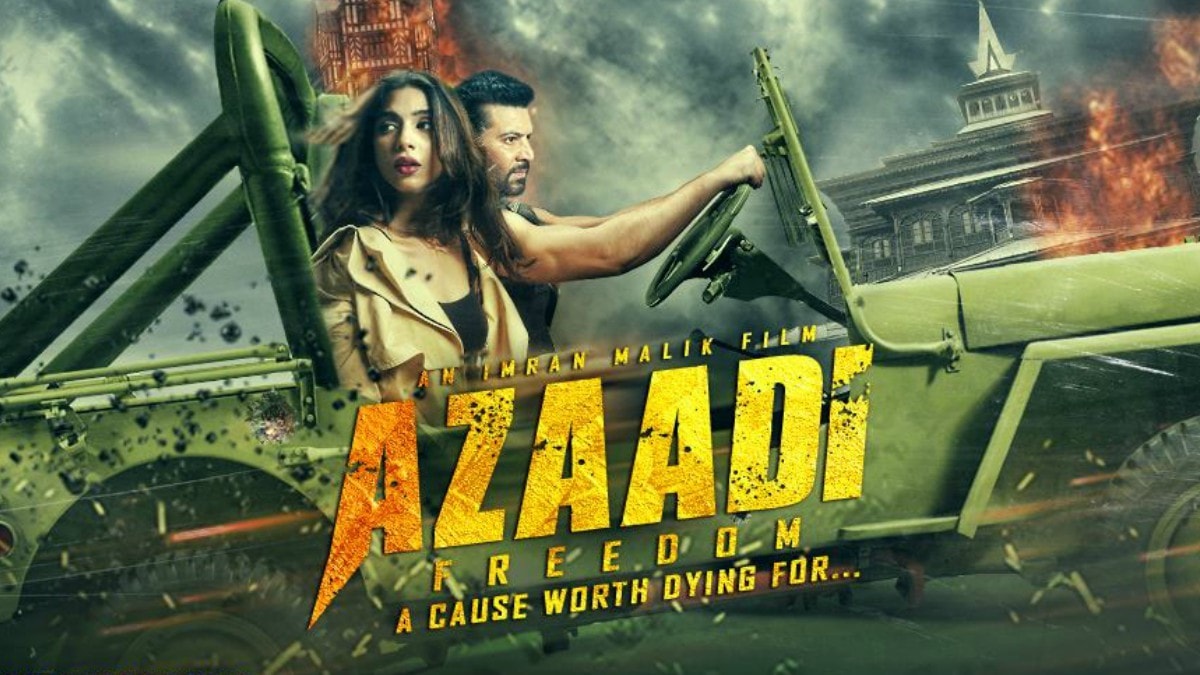Azaadi Movie Review, is a Pakistani film that delves into themes of patriotism, love, and freedom against the backdrop of historical and political turmoil. Directed by Imran Malik and released in 2018, “Azaadi” captures the struggles and aspirations of individuals caught in the tumultuous events of the Kashmir conflict. In this comprehensive review, we will explore the cast, ratings, director’s vision, and the impact of “Azaadi” on Pakistani cinema and audiences.

[ez-toc]
Cast:
The cast of “Azaadi” features talented actors who bring depth and authenticity to their characters, portraying the complex emotions and challenges faced by individuals in conflict-ridden regions. Leading the ensemble are:
1. Moammar Rana as Azaad: Moammar Rana delivers a powerful performance as Azaad, a Kashmiri freedom fighter who becomes a symbol of resistance against oppression. Rana’s portrayal captures Azaad’s courage, conviction, and internal struggles as he fights for justice and freedom.
2. Sonya Hussyn as Zara: Sonya Hussyn shines as Zara, a strong-willed journalist who seeks truth and justice in the midst of conflict. Hussyn’s performance brings depth to Zara’s character, highlighting her determination and empathy for the people affected by the Kashmir conflict.
3. Nadeem Baig as Brigadier Rashid: Nadeem Baig portrays Brigadier Rashid, a military officer caught between duty and conscience. Baig’s nuanced performance adds layers to Rashid’s character, exploring the complexities of loyalty, morality, and personal beliefs.
4. Javed Sheikh as Sardar Saif: Javed Sheikh impresses as Sardar Saif, a seasoned politician navigating the political landscape of Kashmir. Sheikh’s performance captures Sardar Saif’s pragmatism, ambition, and strategic maneuvering in pursuit of power and influence.
The ensemble cast of “Azaadi” includes additional talented actors who contribute to the film’s emotional depth and narrative impact.
Director and Vision:
“Azaadi” is directed by Imran Malik, whose vision for the film combines elements of romance, action, and political drama to create a compelling narrative. Malik’s direction is marked by his attention to detail, thematic depth, and cinematic storytelling techniques.
As the director, Malik explores themes of freedom, sacrifice, and the human cost of conflict, drawing parallels to real-world events and historical struggles. His vision for “Azaadi” goes beyond entertainment, aiming to provoke thought, evoke emotions, and spark dialogue about the Kashmir issue and its impact on individuals and communities.
Malik’s directorial style combines intense action sequences with moments of intimacy and reflection, creating a dynamic and engaging cinematic experience. His use of visuals, music, and storytelling techniques enhances the film’s narrative impact, resonating with audiences on an emotional level.
Ratings and Reception:
“Azaadi” received a mixed response from critics and audiences, with reviews focusing on its thematic relevance, performances, and production values. The film’s ratings reflect a range of opinions and perspectives:
– IMDb: “Azaadi” has an IMDb rating of approximately 6.2/10 based on user reviews, indicating a moderate reception among viewers.
– Rotten Tomatoes: The film does not have a rating on Rotten Tomatoes, as it may not be widely reviewed by international critics.
– Pakistani Media: Reviews from Pakistani media outlets varied, with some praising the film’s performances and thematic depth, while others critiqued certain aspects of the storyline and pacing.
Despite mixed reviews, “Azaadi” resonated with audiences who appreciated its exploration of complex issues and its attempt to shed light on the Kashmir conflict from multiple perspectives.
Impact and Legacy:
“Azaadi” made an impact on Pakistani cinema by addressing sensitive and important themes related to national identity, freedom struggles, and human rights. The film sparked discussions about the Kashmir conflict and raised awareness about the experiences of individuals affected by political unrest and violence.
The performances of the cast, particularly Moammar Rana and Sonya Hussyn, were praised for their emotional depth and authenticity. The film’s production values, including cinematography, music, and set design, added to its cinematic appeal and immersive experience.
While “Azaadi” may have faced challenges in terms of critical reception, its thematic relevance and engagement with contemporary issues contributed to its legacy within Pakistani cinema. The film’s exploration of patriotism, sacrifice, and resilience resonated with audiences looking for narratives that reflect the complexities of real-world conflicts.
In conclusion, “Azaadi” is a film that tackles important themes with sincerity and ambition, offering a perspective on the Kashmir conflict and its impact on individuals and communities. Through strong performances, thematic depth, and directorial vision, the film leaves a mark on Pakistani cinema and contributes to ongoing conversations about national identity, freedom, and social justice.



